TMS Treatment in Los Angeles
Crossroads Institute is committed to providing comprehensive, compassionate care that helps you make the best decision for your mental health needs. We understand how challenging it can sometimes be to take control of your own mental health and are here to support you every step of the way.
Our team is led by experienced physicians and specializes in Transcranial Magnetic Stimulation (TMS) treatment, which is a safe procedure that uses electromagnets to stimulate areas of the brain associated with mood symptoms. TMS is FDA-approved to treat Major Depressive Disorder, Generalized Anxiety Disorder, and Obsessive Compulsive Disorder in adults.
Call us today to see if TMS is right for you.
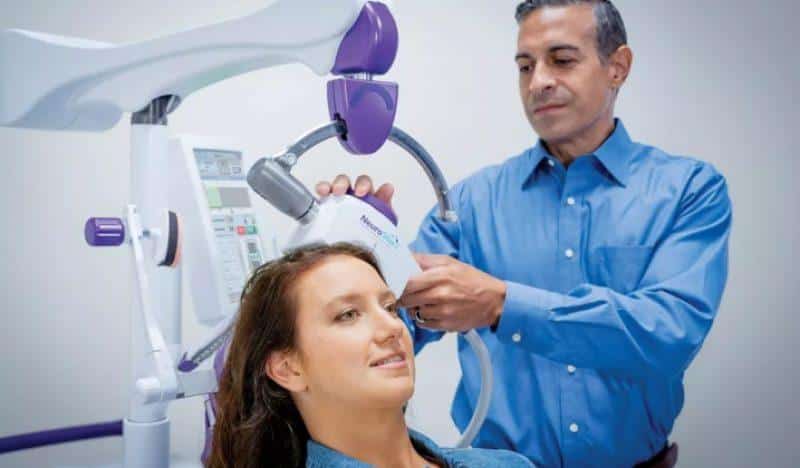
What is TMS for Depression?
TMS is a non-invasive treatment for depression that uses magnetic fields to stimulate nerve cells in the brain. TMS can also be recommended when other forms of therapy and medications have not been successful or as an alternative for those who do not wish to take antidepressant medications.
ECT vs. TMS for Depression
TMS is not ECT. TMS utilizes low-intensity magnetic pulses to stimulate the nerve cells of the brain, whereas Electroconvulsive Therapy (ECT) uses electrical currents to cause the brain to seize, which effectively acts as a “reset.”TMS does not require sedation and has fewer side effects than ECT. Furthermore, TMS can be used on an outpatient basis whereas ECT often requires hospitalization.
TMS is a non-invasive treatment for depression that uses magnetic fields to stimulate nerve cells in the brain. TMS can also be recommended when other forms of therapy and medications have not been successful or as an alternative for those who do not wish to take antidepressant medications.
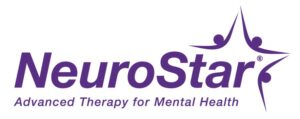
Crossroads Utilizes The Neurostar TMS THerapy System*
NeuroStar uses transcranial magnetic stimulation (TMS) to target key areas of the brain that are underactive in people with depression. It is not ECT (electroconvulsive therapy). While the exact cause of depression is not known, the leading scientific theory is that it is caused by an imbalance of the brain’s neurotransmitters, which are chemical messengers that send signals between brain cells.
During a NeuroStar treatment session, a magnet similar in strength to that used in a magnetic resonance imaging (MRI) machine is used to stimulate nerve cells in the area of the brain thought to control mood. These magnetic pulses may have a positive effect on the brain’s neurotransmitter levels, making long-term remission possible.
Treatment with NeuroStar Advanced Therapy is easy:
- Therapy sessions are conducted in our offices
- You can return to normal activities right away
- You are awake during treatment
- There are no negative effects on memory or sleep
Practices that utilize NeuroStar have delivered more than three million treatments. In a study of more than 14,000 real NeuroStar patients, 83% of patients completing the NeuroStar treatment experienced measurable depression relief and 62% experienced full remission of their depression systems.
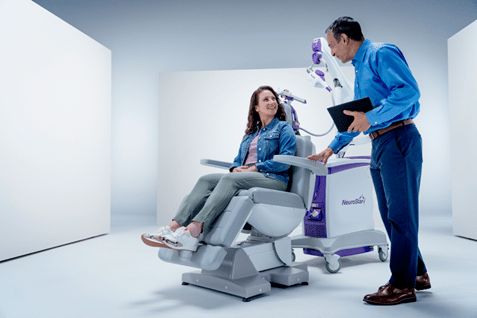
*The NeuroStar Advanced Therapy System is indicated for the treatment of depressive episodes and for decreasing anxiety symptoms for those who may exhibit comorbid anxiety symptoms in adult patients suffering from Major Depressive Disorder (MDD) and who failed to achieve satisfactory improvement from previous antide-pressant medication treatment in the current episode.The NeuroStar Advanced Therapy system is intended to be used as an adjunct for the treatment of adult patients suffering from Obsessive-Compulsive Disorder (OCD).NeuroStar Advanced Therapy is only available by prescription. A doctor can help decide if NeuroStar Advanced Therapy is right for you. Patients’ results may vary. Visit neurostar.com for full safety and prescribing information.
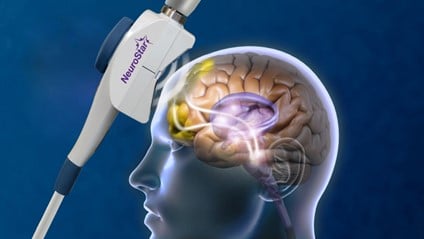
How Does TMS Treat Depression?
TMS for depression works by targeting areas of the brain known to be involved in mood regulation, specifically in the dorsolateral prefrontal cortex (DLPFC). TMS uses a magnetic coil that delivers short pulses to alter neuron patterns. The stimulation then causes the neurons to become more active over time, resulting in decreasing symptoms of depression.
Effectiveness of TMS for Depression
Although the effectiveness of TMS for depression is continued to be studied as a prominent topic for research, many studies have also shown that TMS is effective in reducing symptoms of depression. Below are links to studies that have shown the effectiveness of TMS:
- Carpenter LL, et al. (2012). Transcranial Magnetic Stimulation (TMS) for Major Depression: A Multisite, Naturalistic, Observational Study of Acute Treatment Outcomes in Clinical Practice. Depression and Anxiety, 29(7):587-596. www.ncbi.nlm.nih.gov/pubmed/22689344
- George MS, et al. (2010). Daily Left Prefrontal Transcranial Magnetic Stimulation Therapy for Major Depressive Disorder: A Sham-Controlled Randomized Trial. Arch Gen Psychiatry, 67(5):507-516. www.ncbi.nlm.nih.gov/pubmed/20439832
- Dunner DL, et al. (2014). A Multisite, Naturalistic, Observational Study of Transcranial Magnetic Stimulation (TMS) for Patients with Pharmacoresistant Major Depressive Disorder: Durability of Benefit Over a 1-Year Follow-Up Period. J Clin Psychiatry. 75(12):1394-1401. www.ncbi.nlm.nih.gov/pubmed/25271871
- O’Reardon JP, et al. (2007). Efficacy and Safety of Transcranial Magnetic Stimulation in the Acute Treatment of Major Depression: A Multisite Randomized Controlled Trial. Biol Psychiatry, 62(11):1208-1216. www.ncbi.nlm.nih.gov/pubmed/17573044
What are the Benefits of TMS Treatment?
TMS for depression has many advantages, especially in comparison to traditional treatments for depression. TMS does not have the same side effects, such as weight gain and sexual dysfunction, that are often associated with medications, and studies have shown that symptoms of depression also improve quicker with TMS treatment. In addition, TMS is a non-invasive procedure that does not require anesthesia or surgery and delivers long-term benefits that can last for months or longer after the initial treatments are complete.
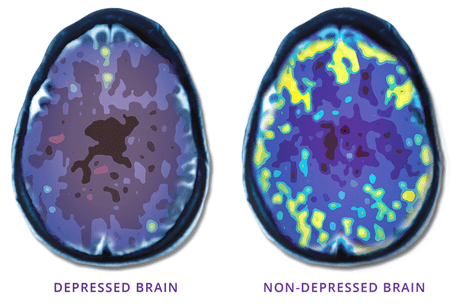
Types of Depression that TMS Benefits
At Crossroads Institute, we specialize in treating different kinds of depression with TMS, including:
- Major depressive disorder (MDD)
- Persistent depressive disorder (PDD)
- Postpartum depression
- Bipolar depression
- Seasonal affective disorder (SAD)
Other Conditions that are Benefited by TMS
We work closely with each patient to determine if TMS is the right course of treatment for them and their condition. Although TMS is primarily used to treat depression, it can also be used to ameliorate a variety of conditions, both psychiatric and neurological. Our qualified staff is able to provide TMS treatment for a number of other conditions such as:
- Obsessive-compulsive disorder (OCD)
- Anxiety disorders
- Post-traumatic stress disorder (PTSD)
What to Expect During a TMS Session
At your first appointment for TMS treatment, your doctor will conduct an evaluation to better understand what you are struggling with and discover any related causes. You will meet with your treater, who will be with you during the duration of your treatment. During a TMS session, an electromagnetic coil will be placed over the scalp near the area of your brain that is involved in mood regulation as you remain awake and alert.
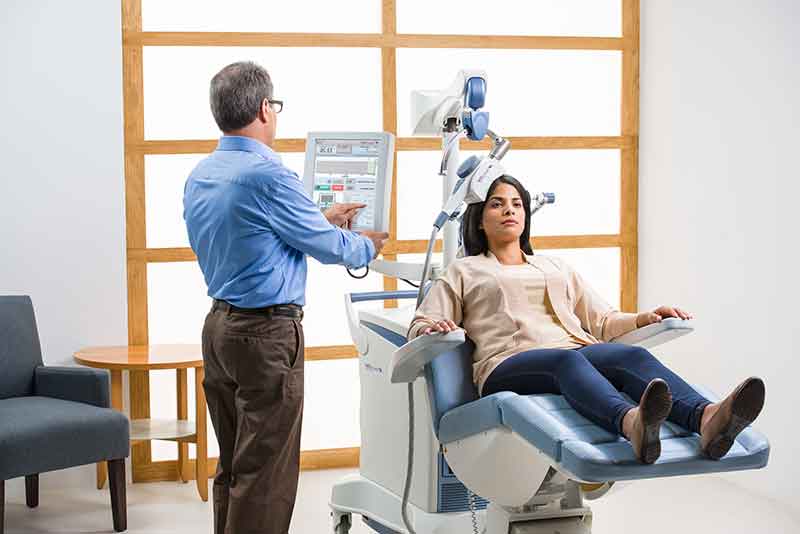
How Many TMS Sessions are Needed?
FDA clearance of TMS treatment for Major Depressive Disorder is based on 36 sessions of treatment. However, the final treatment planning is completed by your doctor, after an evaluation.
How Long Does it Take for TMS to Work?
The effects of TMS typically start to become noticeable after several weeks, usually between 4 and 8 weeks. Although there are some people that experience a dramatic improvement in their symptoms within the first few days, it is important to remember that everyone responds to TMS differently and progress will take time.
Is TMS Covered by Insurance?
TMS has become increasingly popular over the last few years, and as a result, more and more insurance companies are offering coverage for TMS treatment. However, most insurance companies require preauthorization, which is based on specific requirements. Each insurance plan has different criteria for preauthorization. The final determination of payment is made by your company, and there is no guarantee that your insurance company will cover the cost of TMS therapy. It is important to check with your insurer to determine if you have coverage for this type of treatment.
TMS FAQ
Transcranial magnetic stimulation, often referred to as TMS, is a noninvasive procedure that uses magnetic fields to stimulate nerve cells in the brain to improve symptoms of depression. TMS is typically used when antidepressant medications haven’t been effective, have ceased working, or as an alternative to medication.
TMS involves delivering magnetic pulses to specific parts of the brain.
A typical initial course of treatment is about 19-37 minutes daily over 4-6 weeks.
A vast majority of commercial and Medicare plans have recognized the effectiveness of treating depression with TMS Therapy and now cover TMS as part of their plans.
TMS does not circulate in the blood throughout the body, so it does not have side effects like weight gain, sexual dysfunction, nausea, dry mouth, sedation, etc. The most common side effects reported during clinical trials were headache and scalp discomfort —generally mild to moderate—occurring less frequently after the first week of treatment.
No. TMS Therapy involves a unique method of using pulsed magnetic fields for a therapeutic benefit. The intensity of the magnetic field is similar to that of an MRI. These techniques differ radically from the popular use of low-intensity, static magnetic fields. Those products deliver weak and undirected static fields that are not capable of activating brain cells. The activation and stimulation of brain cells are a key part of why TMS is so effective.
TMS Treatment in Los Angeles at Crossroads Institute
At Crossroads Institute we make sure our patients are well cared for by providing personalized care from highly trained clinical staff. We recognize that each patient’s situation is unique, so we customize treatment plans based on their individual needs and goals. Our team works hard to ensure that every patient receives the best possible TMS experience — one built around evidence-based practices, compassion, and support. To schedule a consultation at a location near you, please click on the link below to get started.